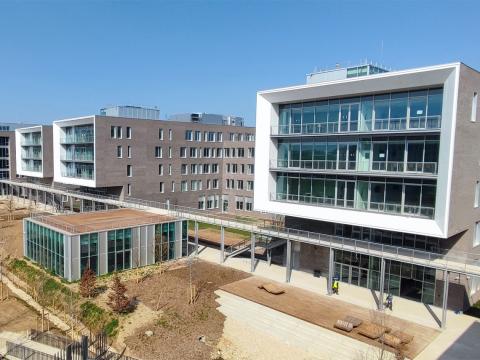
The New Agro Paris-Saclay Campus is Officially Unveiled
April 13 2022The Agro Paris-Saclay Campus was inaugurated this Wednesday, April 13 in the presence of AgroParisTech’s Dean and Executive director Laurent Buisson and Fabrice Marty, there to represent INRAE’s Chairman and Managing Director Philippe Mauguin. The building complex was constructed as part of a comprehensive design, construction, operation, and maintenance contract (CREM) between VINCI Construction France, constructor and authorized representative of the joint venture formed for the purposes of the project, and Campus Agros SAS (CASAS), the customer. Designed by architects Marc Mimram and Jean-Baptiste Lacoudre at the architectural firm Patriarche, working alongside the landscape architects at Agence Ter, the campus is composed of eight buildings totaling 710,000 sq. ft., located around a five-acre wooded park. If offers the two partner institutions a site at the heart of the Paris-Saclay University ecosystem.
A symbol of AgroParisTech and INRAE’s substantial involvement in the organization of major university campuses in France, the new Agro Paris-Saclay campus will serve to enhance the international visibility of this world-class university consortium. Dedicated to promoting high-caliber research, education, and innovation in the areas of life and environmental science and industry, this campus offers world-class tools for scientific research paired with teaching facilities that are perfectly at home among the world’s foremost universities. They will be phased in over the next few months in preparation for the start of the academic year in September 2022.
After beginning construction in January 2019, the Agro Paris-Saclay campus commissioned by AgroParisTech and INRAE is now complete. Covering just over 10 acres in the city of Palaiseau (Essonne), the campus will open its doors to faculty and staff this spring, then to AgroParisTech students in September. It will offer a high-quality working environment that will help foster exchanges both within the academic community and, more broadly, with the consortium’s partners from the Saclay plateau.
In order to complete this project, which required a total investment of €276 million, AgroParisTech received significant government funding (Plan Campus, Ministry of Agriculture and Food) and the Greater Paris Regional Council, in addition to loans and proceeds from the sale of its real estate assets. These various public funding sources covered €255 million of the project’s total budget.
The Agro Paris-Saclay campus is a further step in the continued formation of an ever-growing scientific cluster, after CentraleSupélec and ENSAE Paris in 2017 and Paris-Saclay ENS and the Institut Mines-Telecom in 2019. The new campus, which stands to the west of the École Polytechnique in Palaiseau, is in close proximity to the EDF Lab, the Nano-INNOV site and the business incubator and service center opened in 2019.
A third of the space is allocated to research laboratories (experimental greenhouses, growing rooms, a technology hall, and a food area), and another third to teaching (including two large lecture halls with 400 seats and four with 150 seats). The remainder of the space is devoted to administrative offices and logistics, in addition to communal spaces for the institution and students. The complex is spread out over eight buildings; nearly five acres are occupied by a large wooded garden. The forum, which serves as the entrance to the complex, is composed of a large glass canopy that calls to mind the design of experimental greenhouses. Constructed in glass and completely transparent, the forum reinforces the openness of the site to the neighborhood and the large public square that EPA Paris-Saclay has placed at its entrance: the Place de l’Agronomie. Five classroom buildings and two large research buildings stand around the large open garden, which is crossed by the central road that structures the neighborhood’s spaces. The entire building complex has been certified HQE (High Environmental Quality)—receiving the mark of “excellent” in the HQE “tertiary building” certification category—and Effinature (biodiversity inclusion certification).
Beginning in April 2022, the campus will welcome the first of the institution’s staff members, followed in October 2022 by 2,000 students and 1,350 faculty members, researchers, technicians, and administrative personnel from AgroParisTech and INRAE, all present on the same campus.
The Agro Paris-Saclay campus is a historic step for AgroParisTech. By bringing together its four Greater Paris sites in a single place, which will also house the institution’s headquarters, the synergies between teaching, research, innovation, and student life will increase significantly. In particular, this new campus will strengthen ties between students in different years and majors, as well as between scientific disciplines and specialties covered by AgroParisTech and INRAE. In all, 9 of INRAE’s highly specialized research units on agroecological and food transitions—close to 300 staff members—will be moving to the site this fall. The population of AgroParisTech and INRAE will alone account for 12% of Paris-Saclay University.
An Attractive Agro Campus to Strengthen Paris-Saclay University
This will enable AgroParisTech and INRAE, both founding members of Paris-Saclay University, to share a single territory with a number of organizations, universities, and partner grandes écoles, which together represent nearly 15% of the French research community.
Launched in 2008, the ambitious project was put in place with the strategic objective of ensuring the continuum between education, research, innovation, and technology transfer in the areas of agriculture, food, health, and the environment—all on a single campus. The campus will be a hub for expertise in areas in which research is sorely needed, such as mitigation and adaptation to climate change, food and nutritional safety, human health and the health of the planet, agricultural transitions, the preservation of natural resources, biodiversity restoration, and risk management and anticipation. The Agro campus will make Paris-Saclay a leading research site in France to meet the challenges of agriculture, food, and the environment, and raise the international visibility of French research in these strategic priority areas.

